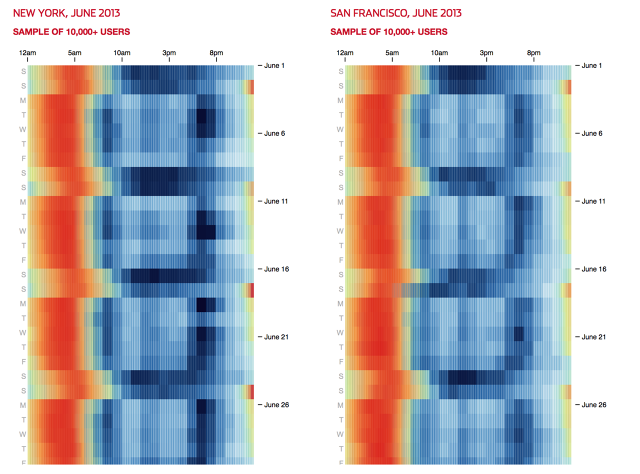The Jawbone Up is a wearable activity tracker that's particularly useful for individuals trying to live healthier healthier lives. But now its also being used as a tool that can give us better insight into the sleeping habits of entire cities.
Over at the Wall Street Journal, editors have been running an anonymous data set provided by Jawbone that tracks the sleeping and activity patterns of hundreds of thousands of Up users in cities around the world. While the data isn't necessarily representative of all the people who live in these cities (in this case, just the ones who can afford a $150 gadget), there are still a number of key takeaways:

• No one is sleeping enough. Even in the most well-rested cities in the world--Melbourne, London, Brisbane, Denver, and Paris--the average person sleeps just a few minutes longer than the 7 hours of sleep per night recommended as the minimum by the Center for Disease Control. And if you're unlucky enough to live in Tokyo, chances are you're actually getting a couple hours less than suggested.
• The more metropolitan the city, the more active (and tired) you are. In cities like New York, the WSJ found, people follow a grid-like routine in which they get up early on weekdays, move a lot during the day, go to bed late, and sleep in on the weekends before rushing around all day Saturday and Sunday. The same is true of San Francisco. Compare that to Orlando and Beijing, though, and you'll discover that people in these cities tend to sleep identically on the weekends and weekdays, and take fewer steps per hour.
• Everyone parties on New Year's Eve--Amazingly, over half of all New Yorkers are awake on New Year's Eve at 2 a.m. compared to only 10% awake at that time any other day of the year. But that's not just true in the Big Apple. Around the end of January, the same thing happens in Beijing for Chinese New Year.
Not only is the Journal's piece an interesting examination of the difference in habits of city dwellers worldwide, it's an intriguing reminder that in a mobile-first world, each and every one of us is a potential data point.
Read more at the Wall Street Journalhere.